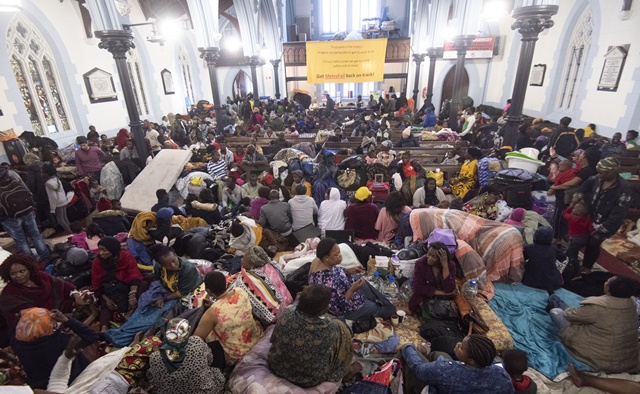Court orders meeting with foreigners in church amid ‘crisis’
All parties were also ordered to file reports by 09.00am on Friday so the court could understand how the matter was being resolved.
by News24 WireThe scene inside the Central Methodist Church in Cape Town, where refugees have been staying since 30 October 2019. Picture: Gallo Images
The Western Cape High Court has heard the City of Cape Town’s application for an urgent interdict against foreign nationals living in a church, but believes a meeting should be held to find an overarching solution.
On Monday, the City described the recent “sit-in” of foreign nationals in Greenmarket Square as a lawless situation, a crisis and a situation which was damaging to tourism and reputation.
As a result, the City applied to the High Court for an urgent interdict against the group.
It wanted an order prohibiting the behaviour and the flouting of health and safety by-laws, alleging that the group was affecting business in the area.
It also alleged that there was urinating and defecating in the streets, cooking over open fires, washing of clothes and bathing around the church area, contributing to fire risks.
But Judge Kate Savage said everyone’s rights needed to be balanced and those involved needed to find “an overarching solution”.
She ordered that a meeting be held between the parties, including the City, the home affairs department and the South African Police Service (SAPS).
“It cannot be a solution to have children, people and women living in the church and in the streets. It’s not a dignified situation for anyone,” she said, addressing a courtroom packed to the brim with foreign nationals.
All parties were also ordered to file reports by 09.00am on Friday so the court could understand how the matter was being resolved.
Lawyers for the home affairs department and the police agreed that a meeting was a practical suggestion.
Advocate Seth Nthai, representing the home affairs department, said a shelter had to be found and the City needed to agree to provide some sort of accommodation.
“We have got no problem from home affairs for doing verification. With the undocumented, we can make sure they are documented.”
The group had been sleeping and living in the corridors of the Waldorf Arcade in the hopes of getting the attention of the UN High Commissioner for Refugees (UNHCR) for almost a month.
There was an operation on October 30 to remove the group and they then sought refuge at the Central Methodist Mission on Greenmarket Square.
Advocate Con Joubert, representing the City, argued that the situation could not continue.
“Suffice to say that what is happening in Greenmarket Square at the moment is a crisis. It has become a lawless situation,” he said.
“Your ladyship would have read about all the businesses which are losing money, the hotel saying they are losing R50 000 a month because of tourists being turned away… Clearly the situation has to be addressed. We are in the middle of the tourism season; citizens are looking to the City and to the court to protect their rights and businesses.”
Jean-Pierre Balous, a spokesperson for the group, told the court that the City was not caring and that they had not seen any of its officials approach them to ask how they were doing.
“In the preamble of the Constitution, it says South Africa belongs to all who live in it. As we are in South Africa, we belong here. We are not just here to come and destroy South Africa or [show] some type of criminality.”
Joubert wanted an undertaking from the group that no officials or businesses would be threatened in the interim.
He said the City had been threatened with legal action from affected parties for damages.
Balous said claims about harassment and threats by their group were nothing more than allegations.
“I do undertake that we are not committing that and that will never happen either,” he said.
Savage said another court hearing would be held on Friday morning.
